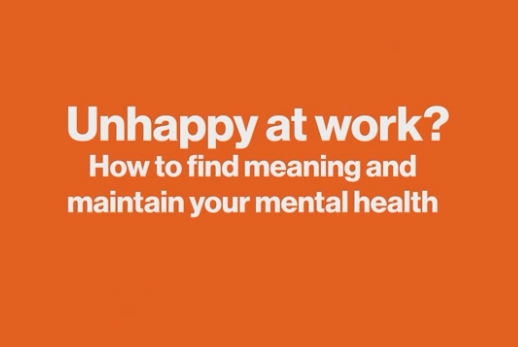There's a statistic that over 90 percent of people go home at the end of the day feeling unfulfilled by their work.
根据统计,超过90%的人在一天结束时回家,对他们的工作感到不满意。
This is the difference between liking your job and loving your job.
这就是喜欢你的工作和热爱你的工作之间的区别。
You can like your job, but do you love your job?
你可能喜欢你的工作,但你爱你的工作吗?
And over 90 percent of the people who work these days don't, and I imagine a world in which that statistic is completely reversed.
现在90%以上工作的人都不喜欢他们的工作,而我想象了一个世界,在那里这个数字完全相反。
The evidence is that about 70 percent of people are not engaged in what they do all day long, and about 18 percent of people are repulsed.
证据显示,大约70%的人没有全身心参与他们全天的工作,大约18%的人是被迫参与的。
They're actively disengaged from what they do.
他们和自己所做的事情渐行渐远。

And I think that the reason why I say this is a problem, and it could even be called an epidemic, is because work is mostly what we do.
我认为,我之所以说这是一个问题,甚至可以说是一种流行病,是因为工作是我们所做的主要事情。
We spend so much more time at work than with our families or those things called hobbies,
我们花在工作上的时间比花在家庭或那些被称为爱好的东西上的时间多得多,
and so I think that the pervasiveness of people feeling like work is a thing that we have to shut off from, a think that we can't be our best selves, a thing that we have to get through on the way to the weekend.
所以我认为,人们普遍感到工作是一件我们必须远离的事情,工作无法让我们成为最好的自己,是我们享受周末所必须忍受的事情。
I think that that is a sort of humanistic sickness.
我认为这种想法是一种人文病症。
And while it is bad for people, that's the humanistic bit, it also is really bad for organizations who get lackluster performance.
虽然这对人来说是不好的,这是人文方面的问题,但对那些业绩不佳的组织来说,这也是非常糟糕的。
I notice that lots of the people that I know who are depressed and anxious their depression and anxiety focus around their work.
我注意到,我认识的很多抑郁和焦虑的人,他们的抑郁和焦虑都源自工作。
So, I started looking at well how do people feel about their work? What's going on here?
因此,我开始关注人们对自己的工作有何感受?到底发生了什么?
Gallup did the most detailed study that's ever been done on this.
盖洛普做了有史以来最详细的研究。
What they found is 13 percent of us like our work most of the time.
他们发现,我们中有13%的人大多数时候都喜欢自己的工作。
Sixty-three percent of us are what they called sleepwalking through our work—we don't like it, we don't hate it, we tolerate it.
有63%的人视工作如鸡肋--不喜欢,不讨厌,可以容忍。
Twenty four percent of us hate our jobs.
有24%的人讨厌自己的工作。
So you think about that, 87 percent of people in our culture don't like the thing they're doing most of the time.
所以你想想看,在我们的文化中,87%的人不喜欢他们大部分时间在做的事情。
They send their first work email at 7:48 a.m. and clock off at 7:15 p.m. on average.
他们在早上7点48分发出第一封工作邮件,平均在晚上7点15分打卡下班。
Most of us don't want to be doing it.
我们中的大多数人都不愿意做这件事。
Could this have a relationship to our mental health?
这是否与我们的心理健康有关系?
I didn't live back in the 1850s, but all the records suggest that you could buy shoes and those shoes would be sold by some store, some cobbler and maybe there would be three people that worked there.
我没有生活在19世纪50年代,但所有的记录表明,那时候去商店或鞋匠那里买鞋,也许商店会有三个员工。
Rarely would there be five people that worked there.
员工很少能达到五人。
While that probably wasn't the best work in the world, each of the people in the store would watch the customer walk in and then they would make a shoe for that customer and then they would take leather and they would sew it and then they would give it.
虽然这可能不是世界上最好的工作,但商店里的每个人都会看着顾客走进来,然后他们会为顾客做一双鞋,然后拿着皮革,去缝制制造,然后交货。
And around 1890 we got this different idea as a species where we should not sell two pairs of shoes each day but two million.
1890年左右,人类有了这个不同的想法,我们不应该每天只卖两双鞋,而是卖两百万双。
And this ideal of scaling up had certain implications for how work felt and part of that was because it was decided that the way to do this would have extreme efficiency by breaking the work into really small tasks where most of the people don't meet the customer.
这种扩大规模的理想对工作的感觉产生了一定的影响,其中一部分是因为人们决定,通过将工作分解成特别小的任务,大部分人不必与客户见面,这样做的方式将具有极高的效率。
And this idea of removing the meaning from the work was intentional.
这种将意义从工作中去除的想法是有意的。
And the idea of removing the curiosity from the job was intentional.
从工作中去除好奇心的想法也是有意为之。
For Henry Ford curiosity was a bug, it was a problem and he needed to stamp it out in the name of reliability and quality.
对于亨利-福特来说,好奇心是一个错误,是一个问题,他需要以可靠性和质量的名义将其消灭。
Now, I'm not saying we're still acting just like the 1900s, but I am saying that that's when we cut our teeth on management practices.
我不是说我们仍然像20世纪那样行事,但我是说,那是我们在管理实践方面的起步阶段。
So, I think it's, in my own opinion, a lot less about which industry and a lot more about the culture and the expectations for what different employees can bring to the party.
因此,我认为,在我看来,这与哪个行业关系不大,而与文化和对不同员工所能带来的期望关系很大。
When we feel safe in our own environment, when we feel that our leaders care about us as human beings and want to see us grow and build our confidence and our skills, when we feel safe in our own companies trust emerges, it's what happens.
当我们在自己的环境中感到安全时,当我们感受到领导关心我们,希望看到我们成长并建立信心和技能时,当我们在自己的公司感到安全时,信任就会出现,就是这样。
There appears to be a part of our brain called the ventral stratum, that's the technical term, or you also could call it the seeking system, and this system is urging us to explore the boundaries of what we know.
我们的大脑中似乎有一部分被称为腹层,这是专业术语,或者你也可以称之为寻求系统,这个系统正在敦促我们探索我们所知的边界。
It's urging us to be curious, and by the way I mean innately.
它在敦促我们保持与生俱来的好奇心。
And evolutionarily this system was developed to help us, to keep us learning.
在进化过程中,人类发育出了这个系统,帮助我们不断学习。
And so, when I learned about this seeking system it really turned me on, because it started to give me an insight into why disengagement from boring work that may not be a bug that might be a feature.
因此,当我了解到这个寻求系统时,它真的让我很兴奋,因为它开始让我深入了解为什么脱离无聊的工作可能并不是错误,而是一种特点。
We know that the concept of looking for the outcome or the effect of our behavior is something that our seeking system is urging us to do, but it's also interesting to take a step back from that and just think about how all of us have stories running around in our brains about why we do what we do.
我们知道,我们的寻求系统会敦促我们去寻找我们的行为产生的结果或效果,但退一步说,想想我们所有人的大脑中都有关于我们为什么做某件事的故事,也是很有意思的。













